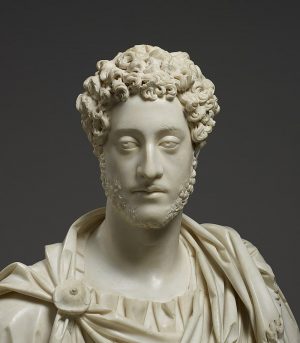Lucius Aurelius Commodus was born in Lanuvium, near Rome, on August 31, 161. His father was the philosopher-king, Marcus Aurelius, who made sure his son received an extensive education. At the age of four, Commodus was declared Caesar by his father.
Reign with his Father
At the age of fourteen, Commodus entered the College of Pontiffs, whose membership was only offered to wealthy families. In 177, when he was 16, Commodus was declared Augustus, and commenced co-rulership with his father. The following year, he joined his father on a campaign on the Danube. However, his father died of natural causes in 180, leaving Commodus the sole emperor.
Sole Emperor
Commodus continued the war against the Danubian tribes for a short while before negotiating for peace. He viewed this peace settlement as a victory and, to commemorate it, ordered a public celebration. Unlike his father’s reign, Commodus’ rule would see fewer wars and conflicts. The problem that hounded Commodus’ rule, though, was his lack of interest in governing the empire. Administrative duties annoyed him, so he passed them on to his freedman and close friend, Saoterus. His constant absence from active rule would later breed many treacheries and assassination attempts on him.
Commodus, though, had a flair for capturing the people’s support. He kept them entertained through constant festivities and gladiatorial games, and the people loved him for these spectacles. However, Commodus had been imposing heavy taxes on the senators to fund his spectacles, and so they soon harbored a simmering hatred for the emperor.
Treacheries
Commodus continued to be careless in his dealings with the senate. In 182, Commodus’ sister, Lucilla, conspired with senators to have him killed. She instructed her nephew, Quintianus, to stab Commodus the moment he entered the Coliseum. Quintianus had positioned himself, but instead of quickly plunging the dagger into Commodus, first shouted, “This is what the senate has sent you!” The Praetorian Guard took Quintianus down before he could stab Commodus, and was executed. Lucilla, meanwhile, was exiled but was later executed too.
Commodus later discovered that one of his praetorian prefects, Tarrutenius Paternus, had a hand in the conspiracy. Paternus had even ordered the killing of Commodus’ close friend, Saoterus. Commodus came to know this through his other praetorian prefect, Sextus Tigidus Perennius. Commodus ordered the execution of Paternus, but did not know that Perennius was also involved in the murder of Saoterus.
Following the assassination attempt, Commodus began spending more time in his villa outside of Rome. He had left the management of the empire to Cleander, a former slave and close friend. Unknown to the emperor, Claeander was the one who had murdered Saoterus, under persuasion from Paternus and Perennius.
Cleander soon started plotting to kill Perennius. He convinced people to tell Commodus how corrupt and treacherous Perennius was. At first, Commodus refused to believe it, but Cleander continued to blacken Perennius’ reputation. Eventually, Commodus became convinced and had Perennius executed.
Cleander resumed his corrupt ways, selling positions in the senate and other government offices. The widespread corruption in the empire was now causing uprisings in some provinces. Later, a grain shortage caused the people to riot and blame Cleander. Cleander fled to Commodus’ villa for protection, but the people clamored for his head. Fearing the riot might worsen, Commodus had Cleander executed.
Megalomania
After the deaths of his close friends, Commodus tried to revive his rule over the empire. First, he announced himself as Hercules reborn. He ordered the senate to declare him a god. In the words of Herodotus, “First he discarded his family name and issued orders that he was to be called not Commodus, son of Marcus, but Hercules, son of Zeus. Abandoning the Roman and imperial mode of dress, he donned the lion skin, and carried the club of Hercules. He erected statues of himself throughout the city for he wished even his statues to inspire fear of him.” After this, he declared himself the rebirth of Romulus, founder of Rome. As founder of Rome, he renamed the city Colonia Lucia Annia Commodiana, and its citizens Commodiani. Then, he set his eyes on fighting as a gladiator. Knowing that he needed to practice first, he had slaves sent over to his house so he could train on them. When he stepped into the arena, he faced off with midgets and gladiators whose limbs were missing. Predictably, his opponents surrendered to him, thus sparing their lives.
Death
In 192, his mistress, Marcia, and some co-conspirators thought Commodus was going mad and was becoming a great danger to the empire. One evening, before the emperor’s usual bath, Marcia served him wine mixed with poison. Commodus fell sick and staggered to the bath. Marcia followed him and saw him vomit up the wine along with the poison. She called for Commodus’ fitness trainer, Narcissus, who went in and choked Commodus.
The senate ordered a damnatio memoriae against Commodus, proclaiming, “The statues of the murdered and gladiator, let them be cast down… Let the moment of the murderer and the gladiator be utterly wiped away!” Commodus’ body was buried at Hadrian’s Mausoleum. It is very seldom that archaeologists unearth an intact statue of the hated emperor.

